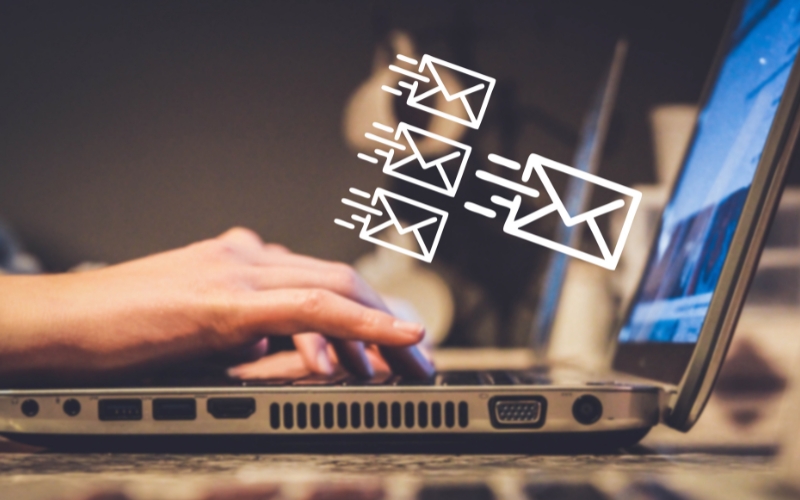Email marketing continues to evolve, and with the integration of Artificial Intelligence (AI) and automation, the future of email campaigns has never looked more promising. As businesses strive to engage their audiences more effectively, AI and automation are helping marketers enhance personalization, optimize email designs, and streamline campaigns for maximum impact. AI-driven tools and automation technologies allow marketers to deliver highly targeted content, personalize customer experiences, and ensure emails reach the right audience at the right time. This article explores how AI is revolutionizing personalization, the benefits of automation in email marketing, and how AI enhances subject lines and A/B testing to improve email performance and conversions.
How AI is Revolutionizing Personalization in Email Campaigns

Personalization has always been a core principle of effective email marketing, but artificial intelligence (AI) is taking it to an entirely new level. AI is enabling businesses to craft more relevant, timely, and individualized email campaigns by leveraging customer data and advanced algorithms. Let’s explore how AI is revolutionizing personalization in email campaigns, making them more impactful and driving higher engagement rates.
The Role of AI in Delivering Personalized Content Based on Customer Behavior and Preferences
AI empowers marketers to create highly personalized email content by analyzing vast amounts of customer data. By tracking user behavior—such as past purchases, browsing habits, engagement with previous emails, and interactions on websites—AI can predict what content will resonate best with each individual subscriber. This enables businesses to send emails that are not only relevant to the recipient but also tailored to their specific needs and interests.
For instance, an e-commerce brand can use AI to recommend products based on a customer’s browsing history. If a customer has shown interest in a particular category of items, AI can generate personalized email content featuring products in that category, increasing the likelihood of a purchase. By understanding customer preferences and behaviors, AI allows email marketers to move beyond generic messages, providing value to the recipient and fostering a stronger relationship with the brand.
How AI-Driven Tools Can Help Segment Audiences More Effectively
Segmentation is a crucial element in personalization, and AI is significantly improving how businesses segment their email audiences. Traditional segmentation relies on basic factors such as age, location, or previous purchases, but AI can take this a step further by analyzing more intricate customer data and behavior patterns. This allows for micro-segmentation, where audiences can be divided into smaller, more specific groups based on nuanced preferences and behaviors.
AI-driven tools can automatically segment email lists by predicting which customers are most likely to engage with certain content or make a purchase. This type of dynamic segmentation ensures that each email is sent to the right person at the right time with content they are most likely to respond to. By automating segmentation, AI not only saves time but also improves targeting precision, leading to higher open rates and conversions.
Examples of AI Technologies That Enhance Personalization
Several AI technologies are making significant strides in personalizing email marketing. One such technology is predictive analytics, which analyzes past customer behavior to forecast future actions. For example, predictive analytics can predict when a customer is most likely to make a purchase, allowing businesses to send timely emails with product recommendations or special offers.
Another example is dynamic content, where AI enables businesses to create email templates that automatically adapt based on the recipient’s preferences. For example, a clothing retailer can send an email with different product recommendations based on the customer’s previous style choices or even current weather conditions in their location. This dynamic approach ensures that each email feels uniquely tailored to the recipient.
AI-powered email personalization tools are continually evolving, allowing businesses to refine their campaigns and provide even more relevant, timely, and personalized content to their subscribers. By embracing these technologies, email marketers can increase engagement, build stronger customer relationships, and drive better results.
In conclusion, AI is transforming email marketing by providing businesses with the ability to send highly personalized content that is data-driven, timely, and relevant. With tools like predictive analytics and dynamic content, AI enables marketers to create more engaging campaigns that resonate with individual subscribers, ultimately improving conversion rates and fostering brand loyalty.
The Rise of Automation: Streamlining Email Campaigns for Efficiency and Effectiveness

Email marketing has come a long way from being a one-size-fits-all approach to a dynamic, data-driven tool that helps businesses engage their audiences more effectively. One of the most transformative developments in email marketing is the rise of automation. By automating repetitive tasks, businesses can not only save time but also enhance the effectiveness of their campaigns. Here’s how automation is reshaping the future of email marketing, making it more efficient and personalized.
The Benefits of Automating Repetitive Tasks in Email Marketing
Automation allows marketers to offload repetitive tasks, freeing up time for more strategic activities. For example, rather than manually sending a welcome email to every new subscriber, businesses can set up automated workflows to send these emails as soon as someone subscribes. This not only improves efficiency but also ensures that no customer is overlooked.
Another area where automation excels is in product recommendations. By analyzing user behavior and past purchases, automated systems can send highly personalized product recommendations without requiring manual input. This ensures that each customer receives relevant suggestions at the right moment, increasing the likelihood of conversions. Similarly, automated follow-up emails can be triggered after a customer abandons their cart or makes a purchase, creating a more seamless and engaging customer experience.
Automation streamlines these processes, allowing businesses to maintain a consistent presence with their audience without the manual effort that would otherwise be required.
How Automation Allows Businesses to Send the Right Message at the Right Time
The true power of email marketing automation lies in its ability to send the right message to the right person at the right time. Through triggered emails, businesses can ensure that their messages are timely and relevant, increasing the chances of engagement and conversion.
For example, a user who browses a website without making a purchase can receive an automated cart abandonment email with a special offer or reminder. Similarly, if a customer hasn’t interacted with your emails for a while, automated re-engagement campaigns can be sent to reignite their interest. These emails are triggered based on user actions and behaviors, ensuring that the content is highly relevant and that the timing is optimal.
By automating these processes, businesses can deliver highly tailored messages at critical points in the customer journey, improving the overall experience while driving more conversions.
Key Automation Tools and Platforms Shaping the Future of Email Marketing
Several tools and platforms have emerged to streamline email marketing automation, each offering unique features that cater to different business needs. Mailchimp, for example, offers user-friendly automation workflows that allow businesses to send welcome emails, birthday messages, and product recommendations with minimal effort. HubSpot is another powerful platform, offering more advanced features like lead scoring and segmentation, which enhance automation’s effectiveness in targeting specific customer groups.
For e-commerce businesses, Klaviyo provides tailored automation for abandoned cart recovery, product recommendations, and post-purchase follow-ups. Its deep integration with e-commerce platforms like Shopify makes it an ideal choice for businesses looking to boost sales with automation.
In addition to these, platforms like ActiveCampaign, Omnisend, and ConvertKit are also popular choices for email automation, each offering different features like advanced segmentation, A/B testing, and multi-channel marketing automation.
In conclusion, email marketing automation is a game-changer for businesses looking to improve efficiency, engagement, and conversions. By automating repetitive tasks and sending timely, relevant messages, businesses can deliver better customer experiences while freeing up resources for more strategic initiatives. The use of powerful tools like Mailchimp, HubSpot, and Klaviyo makes it easier than ever to integrate automation into your email marketing strategy, shaping the future of how brands connect with their audiences.
The Impact of AI on Email Subject Lines and A/B Testing

Email marketing remains one of the most powerful ways to engage customers, and the rise of Artificial Intelligence (AI) is enhancing its potential. AI has begun transforming key aspects of email marketing, particularly in optimizing subject lines and A/B testing, two critical components that significantly influence the effectiveness of email campaigns. As AI tools become increasingly sophisticated, they offer marketers new opportunities to predict performance, improve engagement, and drive higher conversion rates.
How AI Can Predict the Best-Performing Subject Lines Based on Past Campaigns and Customer Behavior
One of the most significant ways AI is transforming email marketing is through its ability to predict the best-performing subject lines. Traditionally, marketers would manually test different subject lines or rely on intuition to create catchy and engaging headlines. However, AI now allows marketers to analyze historical data from past campaigns and customer behavior patterns to identify which subject lines are most likely to perform well.
AI tools use machine learning algorithms to analyze past interactions, such as open rates, click-through rates, and customer segmentation. By examining this data, AI can determine which words, tone, and phrasing resonate best with specific audiences. For example, if an AI tool notices that subject lines with personalization, such as including the recipient’s first name, have consistently higher open rates, it will suggest similar approaches for future campaigns. This predictive capability ensures that subject lines are not only engaging but also tailored to the preferences and behaviors of individual subscribers.
By automating this process, AI reduces the guesswork involved in crafting compelling subject lines, allowing marketers to create more targeted and effective emails that drive better results.
The Role of AI in A/B Testing to Optimize Email Performance and Conversions
A/B testing has long been an essential method for optimizing email campaigns. Traditionally, marketers would test one element at a time—such as subject lines, CTAs, or images—and compare performance. AI takes A/B testing to the next level by automating the process and analyzing multiple variables simultaneously to determine the most effective combinations.
AI can efficiently run multiple tests on various components of an email, from subject lines to design elements. It can then use real-time data to adjust the campaign in progress, optimizing content as it goes. This ensures that the email is continuously improved for maximum engagement and conversion, rather than waiting for the results of tests to accumulate over several days.
With AI-driven A/B testing, marketers can quickly identify which combinations of subject lines, designs, and content types generate the best results, ultimately increasing ROI without the time-consuming manual process.
Future Trends in AI-Driven Optimization for Email Subject Lines, Designs, and Content
As AI technology continues to evolve, the future of email marketing looks even more promising. In addition to improving subject lines and A/B testing, AI is expected to play a larger role in optimizing the entire email content. For instance, AI tools will likely become more adept at personalizing the email body based on recipient data, adjusting messaging, tone, and offers depending on individual preferences.
Moreover, AI will likely influence how designs are created and adapted. Using machine learning algorithms, AI can test design elements, such as layout, color schemes, and images, to ensure they align with what drives higher engagement for specific segments of the audience.
In the coming years, marketers can expect AI to evolve from being a tool for optimization to a complete automation system that delivers personalized, high-converting emails at scale. This shift will make email campaigns even more effective, reducing manual effort while improving customer experiences and increasing conversion rates.
In conclusion, AI is significantly enhancing the effectiveness of email marketing campaigns, particularly in areas like subject line optimization and A/B testing. By predicting the best-performing subject lines, automating A/B testing processes, and evolving design and content personalization, AI is paving the way for a future where email marketing becomes even more efficient and customer-centric. Marketers who embrace AI-driven strategies will gain a competitive edge, driving higher engagement and conversions from their email campaigns.
Conclusion
In conclusion, AI and automation are not just trends in email marketing—they are reshaping the entire landscape. By leveraging AI to deliver personalized content, automate processes, and optimize email elements like subject lines and designs, marketers can create highly effective and engaging email campaigns. These technologies enable businesses to target customers with precision, improve efficiency, and drive higher conversion rates. As AI continues to advance, its role in email marketing will become even more integral, allowing businesses to connect with their audience in more meaningful ways and achieve greater success in their campaigns. Embracing these innovations will give marketers a significant competitive edge, ensuring their email strategies are future-proof and highly effective.

